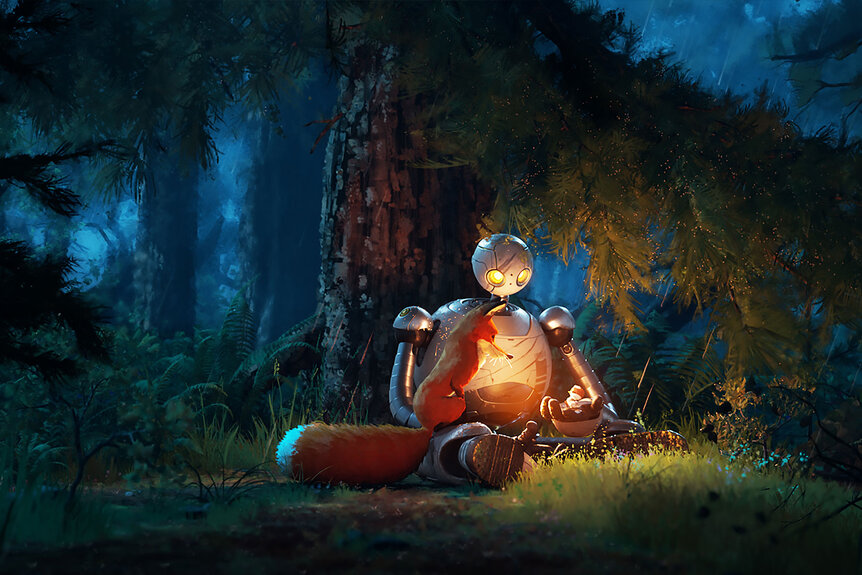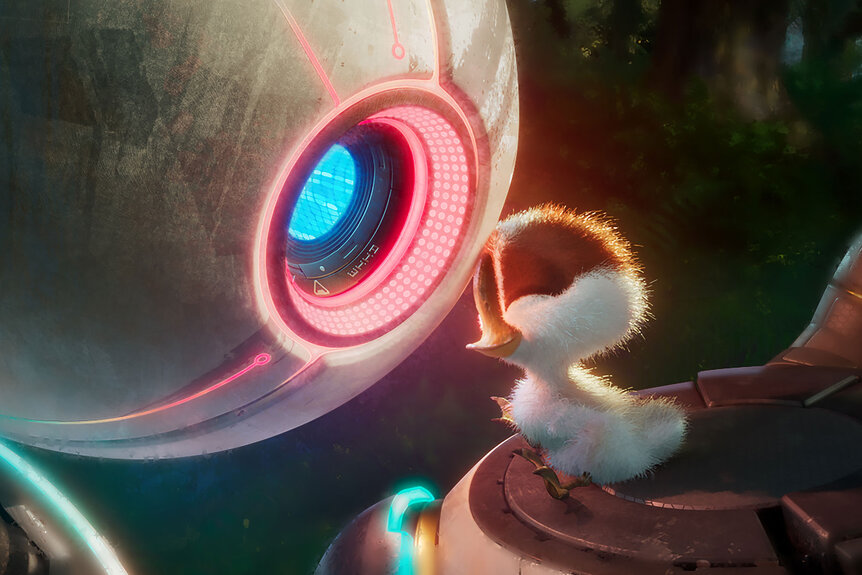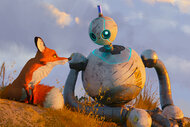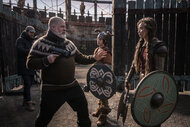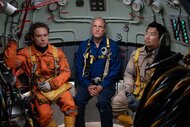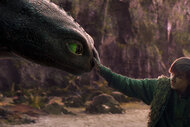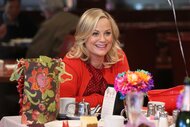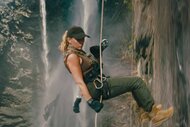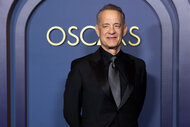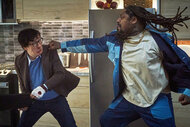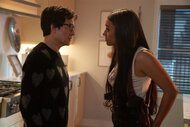The Unexpected Impact E.T. and How to Train Your Dragon Had on The Wild Robot (EXCLUSIVE)
Academy Award-winning composer Kris Bowers shares the personal stories that inspired his regaled score.
Lauded as one of the best animated films of 2024 by critics and audiences alike, DreamWorks Animation's Academy Award-nominated The Wild Robot is now streaming exclusively on Peacock.
Writer/director Chris Sanders (How to Train Your Dragon) shepherded the adaptation based on the book of the same name by author Peter Brown. It tells the unlikely evolution of a human assistant robot, ROZZUM unit 7134 (Roz for short, voiced by Lupita Nyong’o), that gets shipwrecked on a remote island and learns to be a mother and a cherished member of the native animal community.
RELATED: The Wild Robot Moment That Moved Author Peter Brown to Tears: "Everybody Cries at That Scene..."
Consistently praised since the film's release is composer Kris Bowers (The Color Purple) stirring score, which conveys so much emotion in so many of the dialogue-free sequences. In fact, he composed 80-minutes worth of music in the film, including sweeping themes and character cues that become memorable recurring motifs.
Bowers' The Wild Robot music has been nominated for an Academy Award, a Golden Globe, and a Critics' Choice award for Best Original Score. In celebration of its streaming debut, NBC Insider spoke exclusively with Bowers about his animation ambitions as a kid, his personal connections to the film, and classic movie scores that inspired him to help Roz soar.
Composer Kris Bowers' life-long love of animation led him to The Wild Robot
Though he's already an Academy-Award winner for the 2024 Best Documentary Short Subject The Last Repair Shop, Bowers' said he feels that his purest expression of storytelling comes through composing compositions.
"I started playing piano when I was four, and the reason why I honestly feel like I'm a musician is because I happened upon a lot of the cathartic aspects of music," Bowers told NBC Insider. "Core memories for me are having emotions that I didn't have a place to articulate verbally, and that weren't okay for me to articulate, or to feel even that I could clearly express in this very intimate and private way. With the piano, I felt like I was saying exactly what I wanted to say, but only I knew what I was saying and moving through those emotions."
He continued with a chuckle, "It's funny. My wife actually often says that she can understand how I feel much more clearly when I play piano than when I'm talking to her, especially when we're maybe in a disagreement."
RELATED: Could There Be a Sequel to The Wild Robot? Director Chris Sanders Says…
However, in his youth, Bowers considered a career in animation. "When I was a kid, I also wanted to be an animator. I went to cartooning school, and I went to an arts high school," he shared. "I went in for piano, but my plan was to switch to visual arts my sophomore year, and I just never switched."
Bowers cited the Golden Age of Disney cartoons, Tom and Jerry, the Silly Symphony cartoons, and Looney Tunes as foundational to him. So getting to finally score an animated film with The Wild Robot was a dream come true.
The films that inspired The Wild Robot score
Bowers said he worked closely with Sanders to get a sense of the tone and spirit to support the emotional journey of Roz, Brightbill (the gosling in need of a mother, voiced by Kit Connor) and their animal friends.
"We talked a lot about that role for music, and music being a character," he said. "One of the things that interested Chris in hiring me as a composer was actually what he heard in my music, which was this range of being able to create things that had a lot of intimacy and were very small and delicate, but also making it feel really big. I knew that that was gonna be something that we would have to explore musically, making sure that the music had that range to it in expressing those emotions."
Going into the project, Bowers said he looked to a few specific scores that he personally loved, including John Powell's award-winning score for How to Train Your Dragon.
RELATED: Where Is the Island from The Wild Robot? Creators Explain Where Roz's Adventure Takes Place
"The score for it is right on top of my piano, and it's very worn because of how much I studied how he approaches thematic material," Bowers said.
"With this film, I also was looking at E.T.," he continued. "Especially studying how movies like that handle these very grounded themes with a fantastical world. When I think about E.T. saying goodbye to Elliott [Henry Thomas] at the end of the movie, it's a moment that makes me emotional even thinking about it. So much of that, in my mind, is how John Williams decided to pace out the score in that sequence. There's a cadence that happens right at the end that gives me goosebumps whenever I hear it. So, I studied a lot of that."
Interestingly, Williams' score for Star Wars: A New Hope also figured into Bowers' inspirations. "The last 20 minutes is this non-stop action sequence where music is wall-to-wall," he said. "There's like a 30-minute battle sequence at the end of that movie and it never feels tiring musically, even though there are themes that are being repeated and all that. I did a lot of studying of those scores to figure out how best to pace things out in [our] final act."
Life imitates art for The Wild Robot composer Kris Bowers
When Bowers sat down to compose themes for The Wild Robot characters, he found a lot of his own personality traits sprinkled among the cast. "There's so many moments that I remember watching for the first time, and recognizing a little bit later, my own experience with that," he said.
"With Roz, I was thinking about the early days of becoming a parent," he continued. "I think about the building of the home, and at some point, Brightbill is asking to help. Roz allows him to help, and then kind of regrets it pretty soon after. I remember seeing that and thinking it was hilarious. And then months into working on the film, before I approached writing that scene, I was starting to experience moments where my daughter is asking to do something, and I'm like, 'Oh my gosh!' So, I feel like Roz was probably the strongest connection for me, just because at this time of my life, I was just learning how to be a parent in so many ways.
"Then, I feel like Pinktail [Catherine O'Hara's opossum] is also just so funny to me, just some of the things she has to say," he said with a laugh. "Lastly, Brightbill just because of how much I recognize in myself the outcast aspect of his experience. I definitely had a lot of times as a kid feeling like I didn't belong, even amongst people that looked like me. And so that was interesting."
And then he looked to his own family, and how his parents lifted him up like Roz does with Brightbill. "Watching this movie, especially as a new parent, I was thinking about how much my parents sacrificed for me," he shared. "I think about Roz training Brightbill to fly, and when she falls, there's that fluid coming out of her leg, yet she just continues to march on. It reminded me, not only of my wife, but also my mom, thinking about all the things that she's done for me."
Watch The Wild Robot on Peacock, or purchase the Collector's Edition now with extra features on 4K Ultra HD, Blu-ray & DVD.




